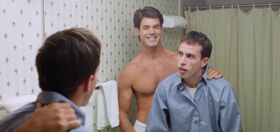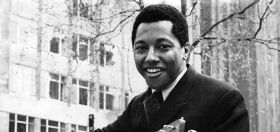
Stephen Kijak is a music man.
After making his debut with the gay-themed romantic comedy Never Met Picasso, music has dominated his career, as have documentaries. Scott Walker: 30 Century Boy explored the work of its titular singer; Stones in Exile profiled the Rolling Stones; If I Leave Here Tomorrow examined the career of Lynyrd Skynyrd and Sid & Judy followed the tumultuous love affair between Judy Garland and her third husband, Sid Luft. Last year, Kijak also contributed his directorial skills to the hybrid scripted/docuseries Equal, about this history of queer rights in America.
Now Kijak combines his passions into a project 15 years in the making. Shoplifters of the World–arriving March 26 on VOD–pays homage to the New Wave rock of The Smiths. On the night of the band’s break up in 1987, longtime friends Cleo (Helena Howard), Patrick (James Bloor), Sheila (Elena Kampouris) and Billy (Nick Krause) gather to mourn the loss of their favorite band. Meanwhile, across town, disgruntled record store clerk Dean (Ellar Coltrane) takes a radio DJ (Joe Manganiello) hostage, demanding the station play only The Smiths all night. What follows is a night none of them will forget–one in which longtime affections begin to surface, and young Patrick confronts his budding sexuality.
We caught up with Kijak to discuss the long road to making the movie, gay life for kids of the 1980s, and how the music of The Smiths inspired him to confront his own queerness. Shoplifters of the World is available in theaters, On Demand and digital March 26.
How about we take this to the next level?
Our newsletter is like a refreshing cocktail (or mocktail) of LGBTQ+ entertainment and pop culture, served up with a side of eye-candy.
So when last we spoke for Sid & Judy, you mentioned Shoplifters of the World. And now here we are. You also said that it was a very personal film for you. Tell me, what effect did the Smiths have on you that inspired a whole film?
Well, the first music film I did, Scott Walker: 30 Century Man back in the day was a real passion project. Five years in the making, Scott’s my hero, it was really a life-changing experience. Since then, almost all the docs have been work for hire. Granted, I love The Stones, and came to love Lynyrd Skynyrd. Even Judy—I wasn’t really a fan at the time. They’ve all been someone else’s story. This is really my story and my band. I was that kid.

Yeah.
[Shoplifters] is personal. The characters are me and my friends in high school. I’m a Patrick, I’m a Dean. I worked in a record store and was sexually confused as a teenager. Was I gay or goth—I couldn’t tell. And that music just gave us a whole way of being. It was a style, a statement. It created a tribe among us left of center weirdos. They just became one of my favorite bands. I was trying to write a script about me and my friends over the course of a summer made up of all the music of the 80s.
Ok.
And my friend Lorianne [Hall], who gets a story credit on the film, asked me if I remembered this holdup in Denver when the Smiths broke up.
Hang on—that’s real? Somebody really held up a radio station and demanded it play The Smiths all night when they broke up?
It is.
Oh my lord.
And I had no idea what she was talking about. She said, “That movie Airheads, it’s based on this thing, but it was really about The Smiths.” So I thought, let me take my characters from Cape Cod and move them to Denver and do the movie all in one night.

That’s awesome.
Yeah, that incident isn’t 100% true. Morrisey even talked about it in interviews as if it had happened. In fact, this kid had staked out the radio station outside of Denver. He sat in the parking lot outside with a bag of The Smiths tapes and a rifle, but he chickened out. Instead of going home he called the security guard over and asked him to call the cops. He was at a point in his life where he needed help. And it was just a tiny story in The Denver Post and became this myth. So, I thought, let him take over the station and see what happens.
Watching the movie, it’s hard not to think of other all-in-one-night music-driven films. Dazed & Confused. Go. Empire Records. American Graffiti. What were your big influences?
American Graffiti loomed large. That’s the template, more so than the John Hughes movies. Obviously, I grew up and was influenced by them. But you go back—I looked at Pretty in Pink, which I loved. And I even have Cleo talk about it in the movie: “Is that really our lives?” I wore the soundtrack out, but now I lean on films like American Graffiti and Diner. Both had a big influence on this, the way we shot it, the style and that kind of slightly rambling nature of a low-wattage dramatic impulse. But it’s a night out—kids in cars wandering around, getting into trouble and having small revelations about themselves.
Obviously, there are references to other 80s music cults as well: Siouxie and the Banshees. Madonna. Grace Jones. Janet Jackson. Metalheads. Something like that could easily come off as a caricature, but your characters shine through that. How do you balance the nostalgic, pop culture references with character?
It’s a hard question to answer. I think it’s about tone. The thing is, it was authentic. It grew authentically. Of the five kids, Sheila was like Lorianne. She had the Madonna thing, but was into The Smiths. She loved The Cure. I remember seeing some snarky person online say “If you like The Smiths you never liked Madonna.”
Not true.
It’s just stupid. Are you kidding? I grew up at the time, honey. I did have Madonna’s first two records secretly stashed in my room. Her influence on dance culture was part of the world we were living in, so it has to be there. Part of it is also the need to work in cameos from people you love. Kevin Aviance, who plays Amazing Grace [a Grace Jones look alike], the bouncer outside the club—Amazing Grace was a real person we pay homage to. So it’s layer upon level. And Siouxie Chu—the Siouxie Su wannabe—she was f*cking great dragging a Robert Smith around with her. And again, we all dressed up. It was like Halloween in the 80s all the time.

Obviously, we know now—or at least recognize—the homoeroticism of The Smiths music. It’s interesting to me in the film that Patrick—who is heavily implied to be gay—is so hostile to gay people or the idea that he could be. We never really learn the root of that. What kind of backstory did you have in mind? And you’ve already alluded to this, but how closely does he mirror your own experience?
That’s the 80s. I didn’t come out until college. You were living in this really ambiguous time when Elton John was married to a woman and Boy George was on TV saying “I’m bisexual.” It’s like…what? The Smiths were homoerotic, but it was also so coded. Even Morrisey himself, as fey and dandy as he was, was like “I’m asexual.”
Yeah.
And of course, especially in suburbia, it was dangerous to be gay. New Wave kind of gave us cover—are we gay or are we goth? We could dress up, we could have crazy hair. You could look like Duran Duran. You could look like The Smiths. You could look like The Cure. You were part of a tribe—guys, girls, bi, gay. We were just different, and it gave us protection.
Right.
I think about that aspect of it a bit. When you see something like Euphoria, which is set in the here & now, where teens are so sexualized and radical. We were not like that. I tried to do something true to the times, which were slow unfolding. We did have internalized homophobia. We were confused. We didn’t know who we were or how we could be. And everyone knew before you did. Then again, the character of Billy—I had a crush on my straight best friend from high school, who, I found out years later, was having gender identity issues.
Oh wow.
And you see a bit of that in Billy. I can see him having those same issues. I wanted to explore that in a subtle way. These are the micro-shifts in our identities we experienced.

For the record—kids in the 90s did not have crazy sex or come out at a young age either. And I speak from experience.
[Laughter]
What kind of comfort did the music of The Smiths offer you as a teenager?
It’s great music. It’s like anytime you hear something you have never heard before and go “Where have you been all my life?” I grew up on Cape Cod and we had a great college station in our town that played the best music. Boston has a great music scene. That’s how I heard New Order for the first time. The Muses—all this great stuff on that radio station. I’ll never forget hearing “How Soon Is Now” for the first time. It’s just like what is this? They call them formative years for a reason. You absorb all this stuff that becomes part of your identity, and you feel things deeper. There’s discovery.
Absolutely.
I remember hearing “How Soon Is Now,” not knowing what it was, and going to the record store weeks later. I bought the 12-inch single because I liked the cover, took it home, put it on and was like it’s the f*cking song. Wow. The world was a lot smaller back then. You discovered new things on the radio, at the record store. It was tactile, you collected it.
The final scenes of the movie hint that the characters have changed over the course of the film, which is always good for a movie. In a sense though, it really seems like they have come to recognize the love they have in their lives. So does that mean the darker elements of new wave are a phase? What’s the comment you’re making?
Like you say, I just think as you say the music embodied all those aspects of tragedy and joy. That was the beauty of the band: a dark, lyrical sensibility set up against this beautiful music. It created a great dynamic that defined their whole sound. And there’s a lot of dark humor and complexity in the lyrics.
Yes.
So it’s a coming of age moment. The clouds part and Cleo realizes there is love. There is joy in her life. I feel like they’re going to run off and be like Bonnie and Clyde.
[Laughter]
In the script, there were a few extra things that happened at the end. She went home and swallowed a bunch of pills.

Wow.
Then she looked up at a Morrisey poster, looks down like who am I kidding? So she spits out the pills and goes and gets [a certain character we’ll not reveal here]. But I thought it was so cliché. I also thought it was darkly funny. The Smiths are highly influenced by the 50s and 60s, the great era of the teenage death song. Those were a real thing. And a lot of their songs are that.
But, I like to think they live happily ever after. And Patrick becomes a regular at the gay bar.
That’s a relief. I was worried. So when you revisit a story like this, which isn’t just youth-driven, it’s based on your own youth, what kind of emotional experience is it for you? Do you feel nostalgic? Do you feel old?
I have to say, having taken so long to get it done, you just shift into work mode. It was so fast. We barely had enough time and money to get it done, so all the emotional effort just went to get through the day. All the emotional work was in the scripting phase. We barely had rehearsal time with the actors—just four or five hours. So hopefully, it’s all packed in there already. The whole thing was so honest, and the cast was great.
It shows.
What’s nice about this mode—this is a quasi-musical. The personal can become general, and the kids in the cast who knew nothing about The Smiths still found their way into the characters, and could relate to them. At a certain point, it ceases to be my story and becomes their story. I had a different Cleo in mind, but Helena created her own. So that’s Cleo now—it’s theirs.
Of course.
And I’m kind of reconnecting with old friends from back then.

Oh, that’s wonderful.
Hopefully, they’ll see themselves in it. They’ve seen the trailer and are really excited to see it. Now, after the fact, I’m kind of letting myself feel it again. [The movie] was so hard to make.
So is this your most personal film?
For sure. Scott Walker, because I knew him, went so deep for me. But this is really raw. In a way, because its a band with die-hard fans, the fans kind of “own” it. So it’s like how dare you make a movie about my band? Everyone is going to have their own version of what a film with The Smiths music should be, I just happened to do it and tell my story. So I’m trying not to look at comments. I made the movie for four or five people, so if it catches on, I’m really happy about it.
That’s a fantastic attitude. So for younger people who may not know The Smiths that look at the film—what do you want them to understand about that time and that music?
I don’t know. That’s a hard question. It’s an accumulation of stuff. I wanted to try to create a very different look at the 80s: a specific, different approach. Of course, as we were making it, we were in the throes of Trump world, so in a weird way, it’s reflexive. The world of the time we were fighting Reaganism. ACT UP was fighting an administration that was ignoring AIDS and demonizing gay people. Trump is just a demonic clown version of Ronald Reagan, so the eras overlap and aligning. We just wanted to create a different kind of time capsule.
Right on.
I’ve said this before, but it’s like if the kids in John Hughes’ movies grew up and made a movie about what it was really like. And again, this is my Smiths story. So it’s a collage effect of ideas that I still carry with me today. It’s a big mixtape.
So where do you go from here?
I’m attached to a feature doc about Rock Hudson in the 80s, looking at AIDS. It’s kind of about his accidental activism, and how he changed the conversation. And I already have my next narrative written. It’s set in ‘89 with a different band, and it’s a lot more queer. But that’s all I can say.
Shoplifters of the World is available theaters, On Demand and digital March 26.






















Mr. Stadnick
Good article makes me want to see the film.
BuzzBuzzard
That this article misspelled the name of Morrissey–ostensibly the focus of the film—and Siouxsie Sioux, among other things, makes me sad. The interviewer’s responses (Yeah, Right, Oh Wow, etc.) also don’t do much to illuminate the vision of the film, though at least the filmmaker was much better spoken.
jniceny
This article describes The Smiths as “new wave,” when they were not. Part of Marr’s project with The Smiths was a rejection of New Wave. Even though the Smiths came on the scene in the wave of bands after the Post-Punk wave, if you have to pick a label or genre “post-punk” is probably the most accurate. In a Noisey interview Marr says, ““My generation were the wave after post-punk…. I’ve called myself a post-punk musician because unusually there’s been no tag put on the wave that I came out of. One of the legacies of post-punk was no rock, no rockism, no rockism at all. No rockism in your guitar playing, no rockism in your clothes, no rockism in your behaviour or your lyrics or your politics.”